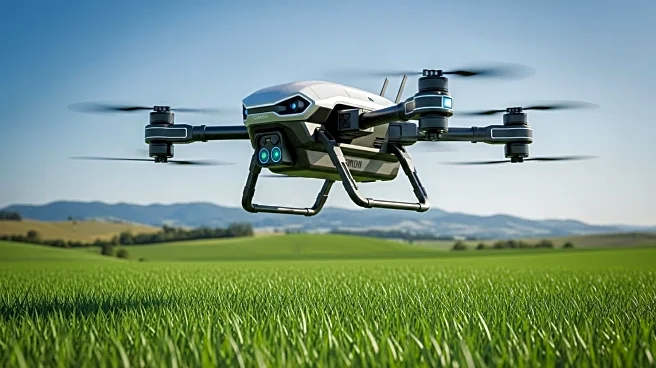What's Happening?
The global market for generative AI in agriculture is projected to experience significant growth, expanding from USD 226.2 million in 2024 to USD 2.15 billion by 2033. This growth is driven by the increasing adoption of AI models that empower farmers with data-driven insights for precision agriculture. Companies like Agmatix, AgroScout, Bayer, Carbon Robotics, Deere & Company, DeepAgro, IBM, KissanAI, Microsoft, and Syngenta are at the forefront of this technological advancement. These AI solutions are enhancing decision-making processes by integrating satellite imagery, IoT data, and advanced management systems, which optimize resource efficiency and improve crop outcomes. The collaboration between Bayer AG, Microsoft, and Ernst & Young exemplifies the momentum towards intelligent farming solutions.
Why It's Important?
The integration of generative AI in agriculture is poised to revolutionize farming practices by providing precise, data-driven insights that enhance operational efficiency and crop yields. This technological shift is particularly beneficial for smallholder farmers in emerging regions, offering scalable solutions that support climate resilience and resource optimization. The advancements in AI-driven farming solutions are expected to mitigate operational risks and support sustainable agricultural practices, potentially transforming the agricultural landscape and contributing to global food security.
What's Next?
As the market for generative AI in agriculture continues to grow, further collaborations and technological innovations are anticipated. Stakeholders in the agricultural sector, including farmers, agribusinesses, and technology providers, are likely to increase their investment in AI solutions to enhance productivity and sustainability. The ongoing development of AI models tailored for specific regional needs will further drive the adoption of these technologies, potentially leading to widespread changes in agricultural practices and policies.
Beyond the Headlines
The rise of AI in agriculture also raises ethical and cultural considerations, such as data privacy and the digital divide between technologically advanced and developing regions. Ensuring equitable access to AI technologies and addressing potential biases in AI models are critical challenges that need to be addressed to fully realize the benefits of AI in agriculture.









